Noah (2014)
Directed by: Darren Aronofsky
Written by: Ari Handel, Darren Aronofsky
Starring: Anthony Hopkins, Jennifer Connelly, Ray Winstone, Russell Crowe
USA
IN CINEMAS NOW
RUNNING TIME: 138 min
REVIEWED BY: Dr Lenera, Official HCF Critic
As a young boy, Noah witnessed his father being killed by a young king named Tubal-Cain, who wanted to seize their land. The king then looted Lamech’s corpse for an ancient snake skin which had been passed down from Adam and Eve to Seth and his descendants while Noah hid away. Many years later, Noah is living with his wife Naameh and his three sons, Shem, Ham, and Japheth. Haunted by vivid dreams of a flood , Noah becomes convinced that the Creator is telling him that all life will be destroyed by water. He travels with his family to visit his grandfather, Methuselah, who gives him a seed passed down from the Garden of Eden. He plants it and an entire forest grows in seconds. Noah announces that all the wood will be used to build an ark….
It seems that any religious film, or film based on a religious subject, is bound to cause much fuss, but after reading the rows on places like the IMDB, you could be forgiven for thinking that people have gone mad. On one side you have your extreme Christians who won’t tolerate any deviation from their Holy Bible [one irritating result of this being that huge numbers of them, many of whom haven’t even seen the film, have rated it 1 out of 10 on the IMDB which drastically lowers its overall score] and on the other side you have your extreme Atheists who just don’t tolerate Christians [and it does often seem to be Christianity they hate more than any other religion for some reason] and therefore think that any Christian-based material is nonsense and worthy of nothing more than scorn. Frankly I think it’s all a bit pathetic and is evidence of huge narrow mindedness. All this doesn’t seem to have harmed the box office takings, which are surprisingly high in a time where sword and sandal epics tend not to attract the paying public and are even considered passé by many, though of course we almost didn’t get to see director Darren Aronofsky’s original cut, the studio laughably trying out an enormously cut down and re-edited version to please all these fanatical Christians in the States.
Now I love sword and sandal epics, though they don’t tend to be very good at the moment. Hell, I even tend to enjoy Biblical films because I think they are great stories full of the ingredients that great stories have. Therefore I could hardly wait to see what the genius director of Black Swan, The Fountain and Requiem For A Dream, who actually wrote a poem about Noah for school that won a United Nations contest and has clearly been interested in the story ever since, would do with Noah. The result is one of those wonderfully ambitious, messy follies that reaches for greatness and doesn’t really succeed, but is far more praise-worthy and interesting than most of the other stuff that’s out there at the moment. Now Aronofsky is an Atheist, said fact in itself obviously being enough to upset many, and his film doesn’t follow the story of Noah exactly, though it’s such a short story that any film adaptation would have to add a whole lot. However, it does explore Christian values such as faith, obedience, providence and salvation, Aronofsky certainly respectful of these things despite not being a Christian, and to me he doesn’t insult the Bible or God. This isn’t the Old Testament of Sunday school, this is the Old Testament closer to how it actually is, full of violence, harshness and ambiguities, containing supposedly sympathetic characters who sack cities massacring women and children, or supposedly sympathetic characters who commit incest, and a God who is as cruel more than he is kind. Aronofksy and his co-writer Ari Handel have taken many liberties, but they’ve taken many of them with thought and even respect for the deep themes of the story.
Noah is not set in a conventional Middle Eastern past. Rather, and it’s a perfectly decent idea considering that equivalents of the tale of Noah exist in many ancient mythologies, it’s set in a more fantastical past that doesn’t seem to be part of any particular culture, though it sometimes actually feels that it’s all taking place in a post-apocalyptic world with the amount of pains that have been taken to present a world that has gone to rot. There’s even mention of an industrial civilisation, though it’s ludicrous that any ancient civilisation would be able to almost entirely ‘ruin’ the world, meaning that Aronovky and Handel make a bit of a mistake in bringing an environmentalist agenda to the story. It also leaves them to contradict themselves with things like us being shown the remnants of a forest that has been destroyed, yet we have Noah do exactly the same thing when he builds his Ark, unless it’s meant ironically, which I doubt. Still, Noah’s forbidding world is still a convincing one, the Icelandic locations superbly utilised, at least until the Seraphim appear. They’re fallen angels who have been transformed into rock giants, which is a cool idea, but they just look and move like bloody Transformers, a problem when they get a huge amount of screen time!
Aronovsky and Handel do successfully bring in hints of other Bible tales like Sodom and Gomorrah and Androcles and The Lion, even if certain other elements like one of Noah’s son’s falling for a woman from the other side of the tracks seem to be given short shrift. Noah feels a bit cut down, yet it’s long enough already and some scenes and elements don’t seem to have a whole lot of point. The villain of the piece for quite a while seems to be Tubal-Cain, the brutal king who supposedly rules where Noah is building his ark, but as the flood gets underway and after a Lord Of The Rings-esque battle scene, it seems that Noah himself is becoming the bad guy. The film really does delve into some dark waters, daring to ask if religious zealotry and paranoid delusion might be the same thing, and creates some very uncomfortable tension, while those who hate what the writers have done with the character should probably remember tales like the story of Abraham, whom God asked to sacrifice his son to test his faith. It helps immensely that, after some rather ropey performances, Russell Crowe is back to being his powerful best as an actor, conveying his character’s internal conflicts very convincingly. Of course Ray Winstone just does his usual hard man act and Logan Lerman still has no charisma whatsoever.
Aronofsky sometimes seems a little lost and a little ill at ease in a big budget fantasy movie full of special effects. While Noah certainly fits in with the rest of his filmography which tends to share similar themes like rebirth and an obsessive protagonist, it does seem somewhat studio-constrained, even if what we have here is indeed his original cut. The intoxicating dreamlike feel to all of Aronofsky’s work except The Wrestler is missing here, while the special effects are a mixed bag. The animals look fine, though the actual flood is distinctly underwhelming and very anti-climactic except for one bit where Noah and his family are inside the ark and we here the screams of drowning people from outside, whereupon we cut to the harrowing sight of folk clinging to the top of a mountain as water swoops up to sweep them away. The most interesting scene is a creation sequence, done mostly with quick freeze frames, which begins in space and fast forwards to the destructiveness of mankind. The familiar, simple but strong imagery is effective and there’s even some wit – where are the apes? – though a few of the more personal touches elsewhere grate. I guess that, for instance, if you’re against eating meat, you’ll love a film which is clearly pro-vegetarianism, but if you’re not, like me, then you may get irritated at the obvious messaging. This is the thing about Noah: there’s much that doesn’t work, and much that might even annoy, but there’s also much that’s really great and there’s so much in it to admire even if nobody would probably love everything in the film.
Matthew Libatique’s cinematography gives us lots of lovely silhouette shots, but Clint Mansell’s score is underwhelming. It’s not bad, and backs up whatever occurs on-screen reasonably well, but lacks anything memorable and often just sounds like adaptations of his superb score to The Fountain, which is the Aronofksy film Noah has been most compared to. This project should have inspired Mansell to do better. Aronofsky has made much better movies – in fact I’d say most of his other films are better than Noah – but in a weird way it’s very admirable, and not just that the studio let him go ahead and do it. I’m not entirely convinced that Aronofsky’s nihilism was totally right for this tale, but his fearlessness and authority have certainly given him the right to tell it. Noah may be set in some mythological past, but it seems vital and alive. If only Aronofsky was making Exodus: Gods And Kings rather than that has-been Ridley Scott. We would really have something. As for Noah, I found a lot wrong with it, but there are times it tries really hard to be great and there are traces of a masterpiece here and there.
Rating: 










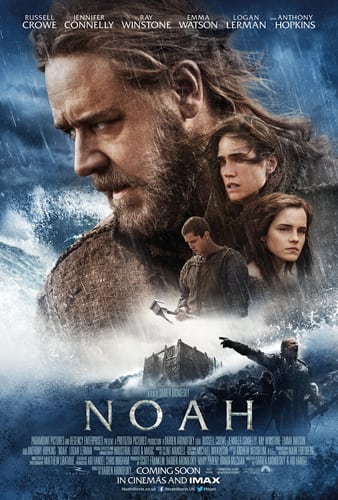
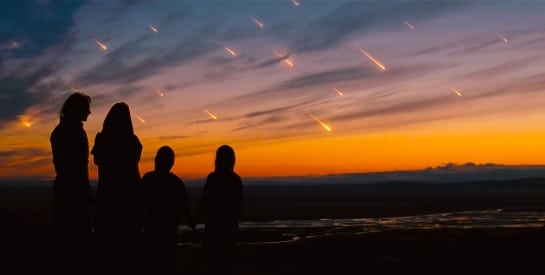
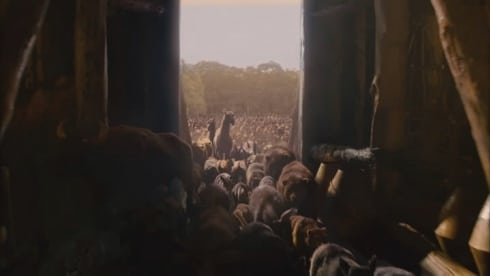

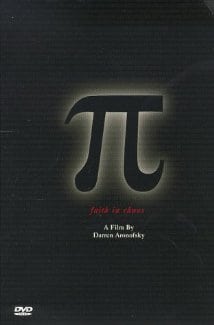
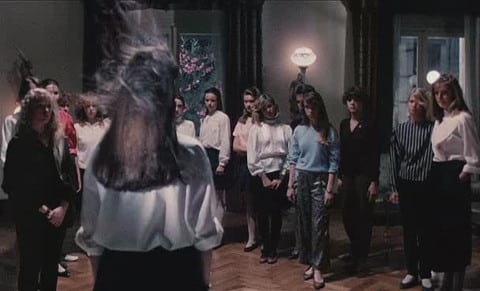
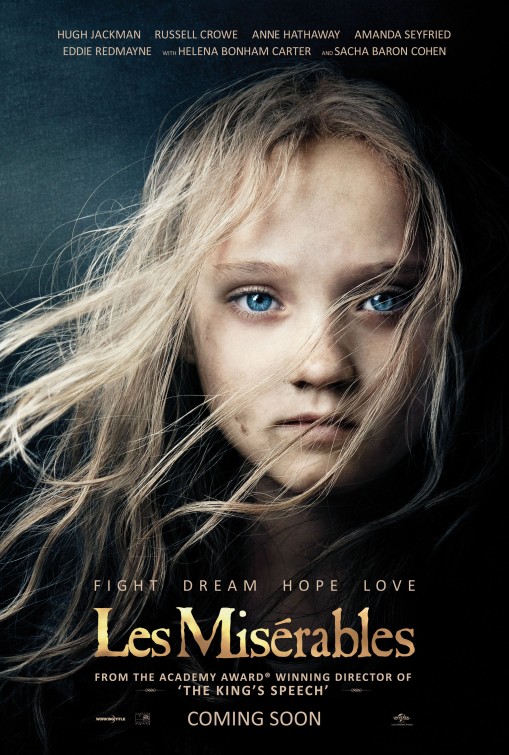
Be the first to comment